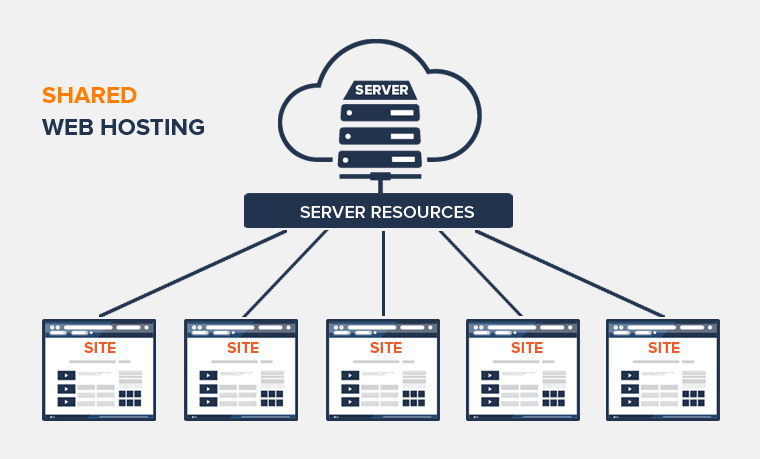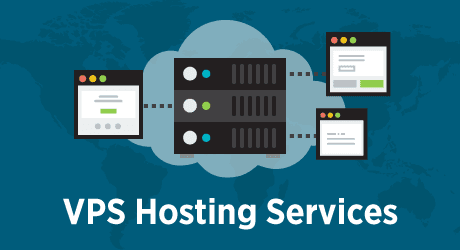A type of Internet hosting service that hosts websites for clients, i.e. it offers the facilities required for them to create and maintain a site and makes it accessible on the World Wide Web. Companies providing web hosting services are sometimes called web hosting.

Table of Contents
Web Hosting requires the following
- one or more servers to act as the host(s) for the sites; servers may be physical or virtual
- colocation for the server(s), providing physical space, electricity, and Internet connectivity
- Domain Name System configuration to define name(s) for the sites and point them to the hosting server(s)
- A web server running on the host
- for each site hosted on the server
- space on the server(s) to hold the files making up the site
- site-specific configuration
- often, a database
- software and credentials allowing the client to access these, enabling them to create, configure, and modify the site
- email connectivity allowing the host and site to send email to the client.
Web Hosting History

Until 1991, the Internet was restricted to use only “… for research and education in the sciences and engineering …” and was used for email, telnet, FTP and USENET traffic—but only a tiny number of web pages. The World Wide Web protocols had only just been written and not until the end of 1993 would there be a graphical web browser for Mac or Windows computers. Even after there was some opening up of Internet access, the situation was confused[clarification needed until 1995.
To host a website on the internet, an individual or company would need their own computer or server.[6] As not all companies had the budget or expertise to do this, web hosting services began to offer to host users’ websites on their own servers, without the client needing to own the necessary infrastructure required to operate the website. The owners of the websites, also called webmasters, would be able to create a website that would be hosted on the web hosting service’s server and published to the web by the web hosting service.
As the number of users on the World Wide Web grew, the pressure for companies, both large and small, to have an online presence grew. By 1995, companies such as Geo Cities, Angelfire and Tripod were offering free hosting.
How do I get started with a website?
To create a website, you’ll have to coordinate several of steps, and picking a web host provider is just one of them.
- Register a domain: You’ll buy this from a domain name registrar like Domain.com, Bluehost, HostGator, GoDaddy, or Google Domain, just to name a few. You pick a unique name to simplify people remembering your IP address (which is just a string of numbers). It’s much easier to remember “HP.com” than “50.32.247.170,” for example. The domain is the same no matter who you buy it from, but the pricing is different depending on services and add-ons.
- Nameservers (DNS): The nameserver is the middle man that points your website visitors toward the correct IP address. Many times the same company will provide both your registrar and DNS services, but you can choose to go with a different DNS if you want. Some common ones are CloudFlare, OpenDNS, CleanBrowsing, and Google Public DNS.
- Web hosting: The actual files that make up the website reside in a server maintained by your web hosting company. Again, this can be the same company as your registrar and DNS server, or you can use a different one for this part of the process.
Types of Hosting
Shared Hosting
Reseller Hosting
VPS Hosting
Dedicated Hosting
Shared Hosting

The hosting cost will be lower and cheaper than any other hosting type. More than one website will be hosted on a single server. The resources will be shared among the websites. So the server price will be shared by the domain administrators.
Shared hosting is one of the most popular web hosting for beginners. It allows different websites to share a single sever. In most cases, the websites don’t know about the other sites. All the sites use the same server resources based on the type of package.
One of the main benefits of shared web hosting is its price tag. It is quite affordable and comes with several package prices for ease of upgrading on a need basis. It also comes with a pre-installed control panel for ease of managing your site and requires less technical maintenance routine.
Shared web hosting also has its fair share of disadvantages. It is characterized by slower load time compared to dedicated servers. An increase in traffic makes it even slower. You also get limited customization options.
A major disadvantage in Shared Web hosting is that a popular website in your server may affect your performance. In shared web hosting, it is difficult to provide better performance.
Reseller Web Hosting

Reseller Web Hosting is also one of the shared hosting but here the user will be provided with a greater technical control such as Web Hosting Manager Control Panel.
Reseller web hosting is excellent for anyone low on cash yet need high-end sites. It involves sharing your allotted space and bandwidth with other sites on behalf of the service provider.
The main reason for the popularity of reseller web hosting is the prospect of low costs. It comes with more freedom and flexibility compared to shared web hosting. While you have to provide customer support to the sites using your servers, you don’t have to worry about the technical side. Your web host is responsible for all professional and web maintenance services.
The only concern that comes with using a reseller web hosting is the risk of extensive damage in case of any hosting issues. Having many users on your server also means it takes longer to regain data in case of any mishap.
The advantages of Reseller Web Hosting is that it will be provided with white label technical support where the hosting company will handle the client’s tech support issues.
A type of Internet hosting service that hosts websites for clients, i.e. it offers the facilities required for them to create and maintain a site and makes it accessible on the World Wide Web.
VPS

It shares a single physical server where it is a stepping stone between shared hosting and getting your own dedicated machine. Virtual private service (VPS) web hosting is more like a shared web hosting but with a visualization technology to provide you dedicated resources on the shared server. The dedicated servers make it more secure and stable for mid-range website traffic. This means you get all the services like a site running on a dedicated server but with a lower cost.
Having a dedicated server also ensures that influx in traffic or any issues in the other sites does not affect your operations.
Even though most people consider starting with a shared web hosting then upgrading to VPS after growth in traffic, some websites are better off with VPS from the start. Some of the sites are eCommerce and any sites which contain sensitive personal information.
The only catch with VPS is that you need a little technical know-how to operate. Well, you can always learn with time.
VPS will be allocated separate RAM and CPU for our website. It will effective in providing an efficient response.
Dedicated Server

Dedicated server hosting is when your website comes with its server. It offers reliable power and flexibility but at a higher cost. You, therefore, must determine if you need all that power before you go for it.
Unlike shared web hosting that limits your configurations and usage, dedicated servers offer exceptional performance that makes it great for high traffic websites. Most website owners prefer starting with shared servers then, later on, upgrade to VPS or dedicated web server depending on needs.
Cost aside, a dedicated web server allows you to handle massive traffic without any lags. It can handle up to 30 times an increase in your daily traffic. It also comes with guaranteed security and faster page loading.
If your site struggles to handle increased traffic and you need more certain security, dedicated web server hosting is the way to go.
If you are using the dedicated web server, then you renting one physical server with full controls (Root User).
Dedicated Servers will be of high cost but it will be effective in handling multiple websites based on the need for resources for the website. Client websites can be hosted and control through this dedicated web server.
Cloud Hosting
These days, cloud hosting has become a bit of a nebulous term. So, we would strongly recommend looking closely at what you are getting if you are signing up for “Cloud Hosting”.
In the beginning, “cloud hosting” referred to a VPS setup scalable to multiple servers; this way, if your web application had a sudden traffic spike, the system would be able to provision more resources and keep things running smoothly.
What are the most important parts of a website?
Domain Name: A Domain Name is the address of a website. It also serves as the identification of that particular website among all websites. The Domain Name helps us reach that specific website. Each website has a unique Domain Name.
Subdomain: As the name suggests, a subdomain is a subcategory of a domain. When we purchase a domain for our website, it typically looks like example .com, example. in, or example .org.
| Web Server | Web Host |
|---|---|
| Web server is basically a computer that usually runs websites. | Web hosting is basically a process of using a server to host a website. |
| It is used to host websites and contain one or more websites. | It enables website to be accessible to users via internet. |
| It provides services to other devices or programs in network. | It allows individuals and organizations to make their website accessible through WWW. |


